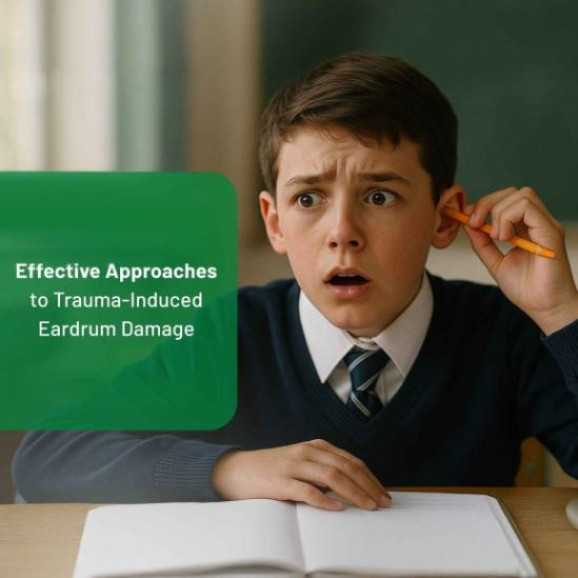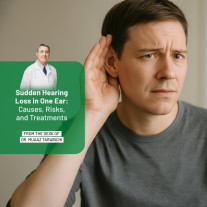Best Ear Doctor Dubai: Effective Eardrum Trauma Treatments Explained
Contact Us
The eardrum, though minuscule in size, acts as a vital gateway between the outer and middle ear. Its primary function is to transmit sound vibrations from the air into mechanical signals for the inner ear to process. However, because of its delicate nature, the eardrum is susceptible to trauma—whether from accidental injury, sudden exposure to loud noises, or inserting foreign objects into the ear canal.
Damage to the eardrum can lead to symptoms such as pain, hearing loss, tinnitus (ringing in the ears), or even infections if left untreated. That’s why seeking immediate care from a qualified specialist is crucial when you suspect any harm has come to your ear. If you’re searching for expert attention and state-of-the-art treatment in Dubai, consider consulting with the best ear doctor Dubai has to offer. The best ENT clinics in Dubai are equipped with modern diagnostic tools and experienced professionals who can assess your condition thoroughly.
Whether you need an evaluation after an accident or are experiencing unexplained discomfort in your ears, visiting a top ear doctor in Dubai ensures that you receive prompt and accurate care. Don’t take chances with your hearing—trust only established clinics renowned for their expertise like the best ENT clinic in Dubai for all your auditory health needs.
What is a Ruptured Eardrum?
A ruptured eardrum is a hole or tear in the tympanic membrane, the thin layer of tissue that vibrates to transmit sound from the outer ear to the middle ear. It also protects the middle and inner ear from bacteria, water, and debris.
When this barrier is compromised, the ear becomes vulnerable to infections, and hearing may be impaired. The severity of a ruptured eardrum depends on the size of the perforation, the cause of trauma, and whether it is accompanied by other injuries to the ear.
Common Causes of Ruptured Eardrums in Trauma
- Blunt Force Injuries
A hit to the head or ear during sports, falls, or road accidents can create enough pressure to rupture the eardrum. Even a minor accident can sometimes cause significant damage depending on the force and angle of impact. - Sudden Loud Noises (Acoustic Trauma)
Explosions, gunshots, or sudden loud blasts produce intense sound waves that can tear the eardrum. People working in high-noise environments are at higher risk if ear protection is not used. - Foreign Objects in the Ear
Inserting cotton swabs, hairpins, or small toys can accidentally puncture the eardrum. Children are particularly vulnerable due to curiosity and small ear canals. - Rapid Pressure Changes
Activities like scuba diving, flying, or rapid elevation changes create sudden shifts in air pressure that the eardrum may not tolerate. This is called barotrauma and can lead to perforation.
Trauma-related ruptures are a common reason patients visit the best ENT clinic in Dubai, seeking both emergency care and long-term solutions.
Symptoms of a Ruptured Eardrum
The symptoms of a ruptured eardrum can vary depending on the cause and severity, but common warning signs include:
- Sharp ear pain that may suddenly occur and then subside
- Hearing loss, usually in the affected ear; it can be temporary or permanent depending on the injury
- Tinnitus (ringing, buzzing, or hissing in the ear)
- Fluid discharge from the ear, which may be clear, pus-filled, or bloody
- Vertigo or dizziness, causing imbalance and unsteadiness
- Sensitivity to loud sounds
It is important to note that some ruptured eardrums may show no obvious pain, especially if the rupture occurs gradually. Therefore, if trauma to the ear is followed by hearing difficulties or fluid discharge, visiting the best ENT doctor in Dubai is strongly recommended.
When Should You See an ENT Specialist?
While some small ruptured eardrums heal naturally within a few weeks, trauma-related ruptures often require professional intervention to prevent complications and ensure proper healing. It’s important to recognize the signs that indicate you should seek medical attention from an expert, such as the BEST EAR DOCTOR DUBAI.
You should see an ENT specialist if you notice persistent or worsening ear pain, ongoing fluid discharge from your ear—especially if it is bloody or has a foul odor—or if your hearing does not improve after a few days. Other warning signs include dizziness, ringing in the ears (tinnitus), or any symptoms of infection like fever. Prompt evaluation by an experienced ENT can help prevent long-term damage and provide you with tailored treatment options for a safe recovery.
How Do EAR, NOSE,THROAT (ENT) Treat Ruptured Eardrums?
Treatment varies depending on the size of the tear, the cause of trauma, and the patient’s age.
1. Observation & Medication
For minor perforations, doctors may recommend:
- Keeping the ear dry and avoiding inserting anything into it
- Prescribing antibiotics to prevent infections
- Monitoring hearing levels over time
Many small ruptures heal on their own within 2–6 weeks, especially when patients follow careful post-trauma care instructions.
2. Ear Patching
If the perforation is moderate or slow to heal, ear patching may be performed. A medical patch is applied over the eardrum to encourage natural healing. This is a minimally invasive procedure commonly offered at the best ENT clinics in Dubai.
3. Surgical Repair (Tympanoplasty)
If the eardrum does not heal naturally or the rupture is large, surgery may be necessary. Tympanoplasty involves grafting tissue over the tear to restore the eardrum.
This procedure:
- Improves hearing and prevents infections
- Is performed under precise microsurgical techniques
- Is handled by the best ENT surgeons in Dubai for optimal results
4. Hearing Rehabilitation
In some trauma cases, damage may extend to the middle ear bones or inner ear structures. Post-treatment, patients may need:
- Hearing aids for temporary or mild hearing loss
- Cochlear implants for more severe cases
Patients in Abu Dhabi and Al Ain can benefit from the Tarabichi Mondy Cochlear Implant Center, where specialized hearing rehabilitation is offered.
Risks and Complications if Left Untreated
Ignoring a ruptured eardrum can result in serious complications:
- Chronic ear infections that may damage the middle and inner ear
- Progressive hearing loss, which could become permanent
- Balance problems due to inner ear involvement
- Ear cysts (cholesteatoma), which can erode bones of the middle ear
- Spread of infection to nearby structures, including the brain in rare cases
Early intervention from the best ENT specialist in Dubai ensures that most ruptured eardrums heal fully and the risk of complications is minimized.
Pediatric Ruptured Eardrums – Special Care for Children
Children are more vulnerable to eardrum injuries due to:
- Smaller ear canals
- Frequent ear infections
- Curiosity leading to insertion of objects
Parents should watch out for signs such as:
- Ear tugging or complaints of pain
- Unexplained hearing difficulty
- Fluid or pus from the ear
- Irritability, crying, or balance issues
Tips for Parents
- Avoid letting children insert objects into their ears
- Monitor children for ear infections and seek early treatment
- Encourage wearing ear protection during swimming, loud events, or sports
- Maintain follow-up appointments with pediatric ENT specialists to ensure proper healing
At Tarabichi ENT, our best pediatric ENT in Dubai team offers gentle, child-friendly care that ensures a smooth recovery and prevents long-term complications.
Recovery and Prevention Tips
After a ruptured eardrum, patients can take practical steps to improve healing and prevent recurrence:
- Keep the ear dry: Avoid swimming or submerging the ear in water until cleared by a doctor
- Avoid inserting objects: Cotton swabs and other items can worsen the rupture
- Follow medication instructions: Complete any prescribed antibiotic or pain-relief courses
- Protect the ear from trauma: Use ear protection during sports or loud activities
- Schedule follow-up appointments: ENT specialists monitor healing and check for complications
Hearing loss should never be ignored. With expert care from Tarabichi ENT, recognized as the best ENT surgeon in Dubai, patients can regain hearing, improve relationships, enhance mental and physical health, and live safer, more independent lives.
At Tarabichi Healthcare, our ENT experts offer world-class hearing loss treatment in Dubai using advanced tools and tailored care plans to help you hear clearly.
Our team of the Best ENT doctors in Dubai, at Tarabichi Healthcare is committed to delivering world-class care with precision and compassion.
Meet our dedicated specialists: Dr. Muaaz Tarabichi, Dr. Michael Timms, Dr. Mustafa Kapadia, Dr. Satish Jain,and Dr. Jamal Kassouma.
We provide minimally invasive treatments tailored to your condition, with a strong focus on safety, accuracy, and long-term results.
Book a consultation for hearing loss treatment in Dubai today and take the first step toward clear, confident hearing.




